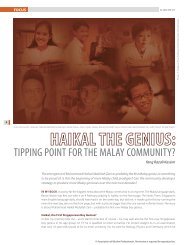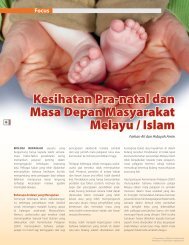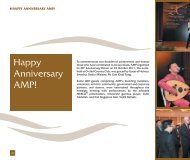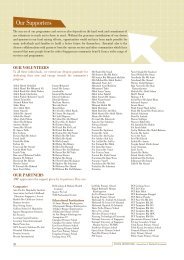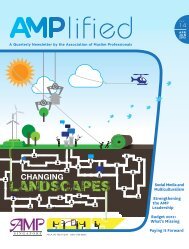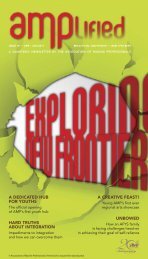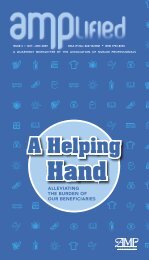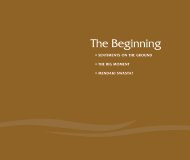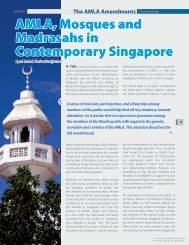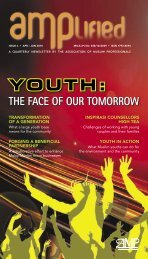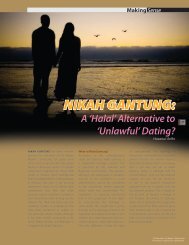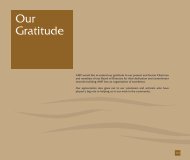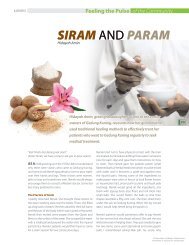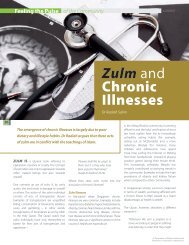The AMLA Amendments - Association of Muslim Professionals
The AMLA Amendments - Association of Muslim Professionals
The AMLA Amendments - Association of Muslim Professionals
You also want an ePaper? Increase the reach of your titles
YUMPU automatically turns print PDFs into web optimized ePapers that Google loves.
KARYAWAN<br />
<strong>The</strong> <strong>AMLA</strong> <strong>Amendments</strong> Overview<br />
Are We<br />
Ambitious<br />
Enough<br />
Mohd Nizam Ismail<br />
THE ADMINISTRATION <strong>of</strong> <strong>Muslim</strong> Law (Amendment) Bill,<br />
which made changes to the Administration <strong>of</strong> <strong>Muslim</strong> Law Act<br />
(<strong>AMLA</strong>) was presented for the first reading in Parliament on 15<br />
September 2008 and passed by the House on 17 November 2008.<br />
As stated by the Minister-in-charge <strong>of</strong> <strong>Muslim</strong> Affairs Dr Yaacob<br />
Ibrahim in his Second Reading speech on 17 November 2008,<br />
<strong>AMLA</strong> “provides for many facets <strong>of</strong> <strong>Muslim</strong> life today”. Indeed, <strong>AMLA</strong>,<br />
since its introduction in 1966, is the key legislation that governs<br />
the running <strong>of</strong> key <strong>Muslim</strong> institutions – the Majlis Ugama Islam<br />
Singapura or the Islamic Religious Council <strong>of</strong> Singapore (MUIS), the<br />
Fatwa Committee in MUIS, the Registry <strong>of</strong> <strong>Muslim</strong> Marriages (ROMM),<br />
the Syariah Court and the Appeal Board – as well as the personal<br />
lives <strong>of</strong> <strong>Muslim</strong>s in Singapore, particularly in relation to marriages,<br />
divorces and inheritance.<br />
Given the centrality <strong>of</strong> <strong>AMLA</strong>, it is not surprising that some perceived<br />
the scope <strong>of</strong> the recent amendments with disappointment. <strong>The</strong>re was<br />
a sense that the changes were not ambitious enough to address the<br />
demands and needs <strong>of</strong> a changing and increasingly globalised <strong>Muslim</strong><br />
community in Singapore.<br />
Rather than setting out the strategic legislative roadmap for the<br />
community in a globalised and modern environment, the <strong>AMLA</strong><br />
seems content in making a potpourri <strong>of</strong> technical “quick-fixes”. <strong>The</strong><br />
key changes to <strong>AMLA</strong> this time were:<br />
• Increasing the rate <strong>of</strong> contributions to the Mosque<br />
Building and Mendaki Fund (MBMF), and to expand the usage <strong>of</strong><br />
MBMF for mosque upgrading, funding <strong>of</strong> madrasahs and to<br />
fund social work for dysfunctional families;<br />
• Raising the minimum <strong>Muslim</strong> marriage age from<br />
16 years to 18 years;<br />
• <strong>The</strong> resort to the District Court for enforcement <strong>of</strong> orders made<br />
by Syariah Court (by removing the need for Syariah Court orders<br />
to be registered at the District Court before enforcement); and<br />
• Appointment <strong>of</strong> a Deputy Registrar <strong>of</strong> the Syariah Court.<br />
Need for Public Consultation<br />
Given the significance <strong>of</strong> <strong>AMLA</strong> to the community, there could<br />
have been public consultation on the Bill. In his Second Reading<br />
Speech, the Minister mentioned a series <strong>of</strong> consultations with<br />
community leaders “since June (2008)”. <strong>The</strong>re was reference to the<br />
media reporting <strong>of</strong> the <strong>AMLA</strong> amendments and <strong>of</strong> “encouraging<br />
discussions” and feedback. However, these processes are not quite<br />
the same as conducting a structured public consultation.<br />
Increasingly, we have seen many government institutions, including<br />
the Monetary Authority <strong>of</strong> Singapore and the Ministry <strong>of</strong> Trade and<br />
Industry, conducting extensive public consultations on changes<br />
to laws and regulations that affect either the financial industry or<br />
the public at large. Typically, public consultation documents are<br />
prepared carefully, setting out details <strong>of</strong> proposed changes to laws;<br />
the underlying policy thinking behind certain proposals; the trade<strong>of</strong>fs<br />
(if any) arising from the proposal; the implications <strong>of</strong> proposed<br />
policies; as well as specific issues or questions that the government<br />
agency would like the public to comment on.<br />
<strong>The</strong> wisdom behind having structured public consultations is<br />
obvious. Such an approach ensures that ideas from the public are<br />
channelled in an organised way, and also ensures that buy-in is<br />
obtained from the public on proposed policies. This process could<br />
have been done for the <strong>AMLA</strong> changes.<br />
Moving away from process, let us look at the impact <strong>of</strong> some <strong>of</strong> the<br />
proposals that were made as well as some <strong>of</strong> the issues that the Bill<br />
could have addressed.<br />
Dysfunctional Families Treated as Community Issues<br />
Going into the substance <strong>of</strong> the proposals, the most significant<br />
change to <strong>AMLA</strong> is in the usage <strong>of</strong> MBMF. Of key concern is the<br />
resort to the MBMF to handle the issue <strong>of</strong> dysfunctional families<br />
within the community, given the prevalence <strong>of</strong> divorces and<br />
remarriages among <strong>Muslim</strong> divorcees.<br />
9



